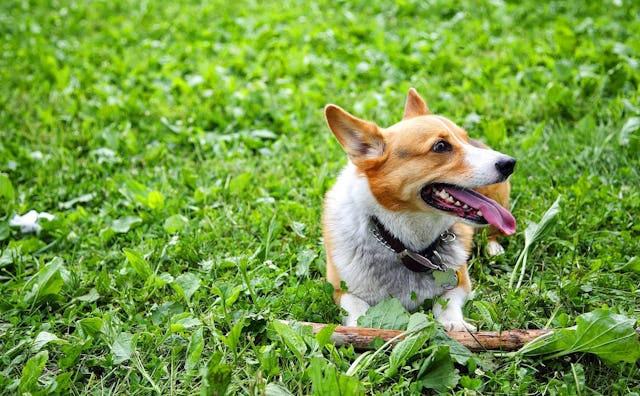Why I'm Buying A 3-Bedroom House For My Dog

My husband and I adopted Hudson, our neurotic corgi, a few months after moving in together. At the age of 33, I was just beginning to dance to the tick of my biological clock, and this baby was adorable, with his stubby, uncertain legs and wagging nub of a tail. He became the instant mayor of our block on the Upper East Side of Manhattan, making friends with all the doormen and posing for photos. He had a beagle girlfriend down the hall, with whom he tumbled and tussled with joyful abandon.
I had never had a pet before, and I soon became obsessed with Hudson’s well-being to an absurd extent. He got four long walks a day, organic food, a faux-shearling winter coat to protect him from the harsh New York City elements and a special dog bed, which he never used. Hudson was also a skilled fetcher. Thanks to my teaching him from day one that fetching equals love, he became a legend amongst our friends for how tirelessly he returned a ball or stick. Low to the ground with little wind resistance, he would shoot like a furry rocket to retrieve a thrown object.
After three years of doggy bliss, I became pregnant. Hudson and I spent hours together, taking walks and playing fetch from the couch. At night he would cuddle on my lap, farther and farther away as my belly expanded, until one morning I awoke with a start. Labor had begun.
© Debra Cole
For the first few weeks of my son’s life, Hudson was protective. He seemed to sense that the new addition was important, something to guard. Soon, however, it dawned on him that the baby was a permanent fixture in our lives, and he was not on board. Not only was the baby sucking all the time and energy from the universe—a gigantic vortex of screaming, pooping hell—he also had a heap of enticing toys with which Hudson was forbidden to play and a chariot of transportation the size of a Chrysler minivan, with wheels to match. Hudson became convinced these stroller wheels were going to roll over and crush his little sausage body.
After a few months of tiptoeing around our one-bedroom apartment, we decided to move the entire family to Brooklyn, where we hoped to have more space and a calmer existence. In one fell swoop, we whisked Hudson out of his comfort zone: away from his favorite corners, doggy girlfriend, doorman-paparazzi following, dog runs. In exchange, we offered him a post-industrial area of Brooklyn that was unexpectedly loud, dirty and filled with barking dogs. There were no dog runs, and although there were early-morning off-leash hours in the park, ask me how often I got out of the apartment that early with an infant in tow.
Soon after moving in, Hudson was attacked in our cement courtyard by a rescued pit bull that had broken through her leash. No one was seriously hurt, but from that point on, my poor dog gave up. Convinced the next dog, noise, child or mop was going to kill him, he barked and bared his teeth incessantly. Then, at around 10 months old, my son began “walking,” which meant pushing a plastic cart-of-destruction with squealing abandon throughout our open-floor-plan apartment. Hudson had nowhere to hide, and he went off the deep end. I was simultaneously distraught and angry.
These days, my 2-year-old son is desperate to play with (and, unfortunately for everyone, hug and kiss) his Hudsy. Hudson is less enthusiastic. He’s gotten fat because we have no good way (or time) to exercise him. Corgis are shepherds: working dogs who need a job. Hudson is woefully unemployed. He doesn’t even sit with us on the couch anymore, preferring to slink away to a dark corner. And no wonder. When I’m not crying, crushed by dog-mommy guilt, I’m yelling at him to drop my son’s toys, stop pulling the leash or quit freaking out every time we brave a doorway, the newest signal of impending death.
© Debra Cole
Why couldn’t he adapt? I was angry at myself for finding my dog so inconvenient when he had once been such a source of joy and comfort. I blamed myself for creating a typically anxious and under-resilient “first child” with my over-protective parenting. But I vowed that Hudson would never be sent to the farm the way my husband’s childhood pets were.
Then on a recent plane trip, my son began screaming apropos of nothing, “Shup-up, Hudsy! Shup-up! Shup-up!” I was less mortified by the yelling (and accompanying dirty looks) than by the realization of how frequently I tell sweet Hudson to shut up. My husband and I soon began discussing whether to give up on our noisy corner of Brooklyn altogether. Wouldn’t it be great to have our own space with a yard for grilling and playing fetch? A place for the dog to hide the next time my son made a beeline for him: “Big kiss for Hudsy!”? A place for all of us to reset our relationship.
We found just the perfect house in a residential area of the Bronx. It has a hilly little backyard—excellent for rummaging, chasing squirrels and stockpiling sticks. Naturally, there are perks for the humans: double the indoor space, a good public elementary school and a surprisingly easier commute. But when I am being honest, we bought the house to give our first child a better life. And isn’t that what every mother wants for her child?
This article was originally published on